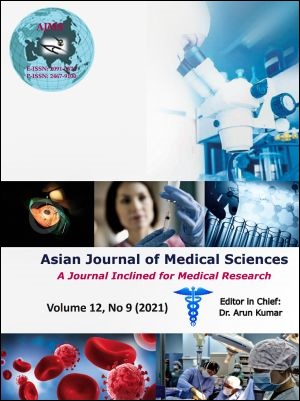Role of LDH levels in differentiating anemias
Keywords:
Lactate dehydrogenase, Megaloblastic anemia, Mixed deficiency anemiaAbstract
Background: There is a need to differentiate megaloblastic anemia from mixed deficiency anemia as both require different management protocols. With the acquisition of more information about them, tests such as serum vitamin estimation and Schilling test, were found to have their limitations. Hence there is a need to search newer diagnostic candidates to differentiate between megaloblastic anemia and mixed deficiency anemia.
Aims and Objective: The current study was undertaken to find usefulness of serum Lactate Dehydrogenase (LDH) in differentiating megaloblastic anemia from mixed deficiency anemia.
Materials and Methods: 100 patients were included in the study. Blood smears were stained and analysed. Complete blood counts were performed. Bone marrow examination was done, where needed. Biochemical tests were performed for estimation of vitamin B12, Folate and for LDH.
Results: Out of the 100 cases 51 were diagnosed as megaloblastic anemia and 49 were diagnosed as mixed deficiency anemia. The LDH levels were significantly higher in cases of megaloblastic anemia as compared to mixed deficiency anemia.
Conclusion: Serum LDH levels can be used in differentiating megaloblastic anemia from mixed deficiency anemia.
Downloads
Downloads
Published
How to Cite
Issue
Section
License
Copyright (c) 2021 Asian Journal of Medical Sciences

This work is licensed under a Creative Commons Attribution-NonCommercial 4.0 International License.
Authors who publish with this journal agree to the following terms:
- The journal holds copyright and publishes the work under a Creative Commons CC-BY-NC license that permits use, distribution and reprduction in any medium, provided the original work is properly cited and is not used for commercial purposes. The journal should be recognised as the original publisher of this work.
- Authors are able to enter into separate, additional contractual arrangements for the non-exclusive distribution of the journal's published version of the work (e.g., post it to an institutional repository or publish it in a book), with an acknowledgement of its initial publication in this journal.
- Authors are permitted and encouraged to post their work online (e.g., in institutional repositories or on their website) prior to and during the submission process, as it can lead to productive exchanges, as well as earlier and greater citation of published work (See The Effect of Open Access).




